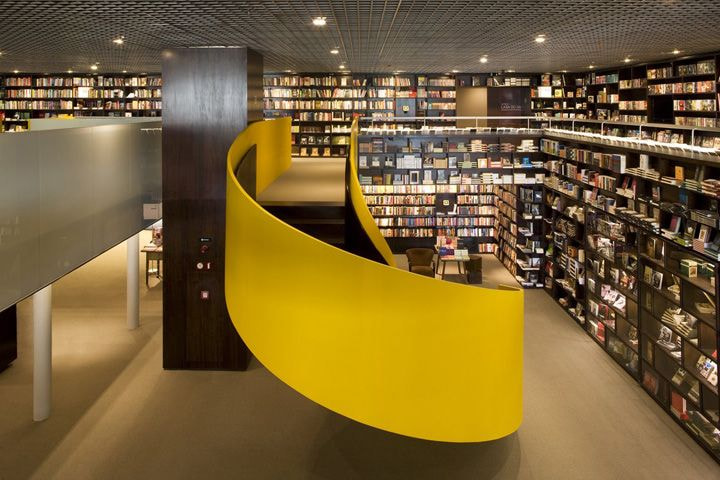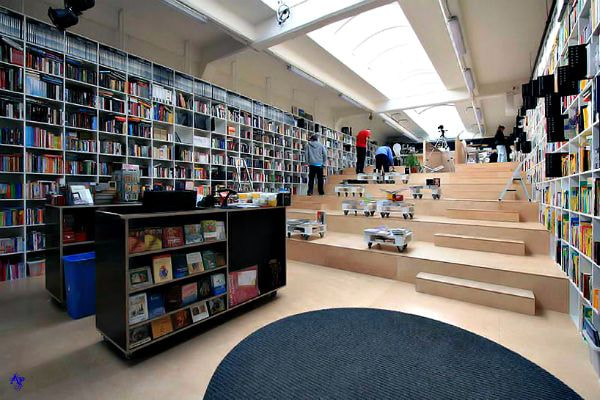In my previous post, I outlined why the bookstore, even if inefficient in selling books, has reasons to exist beyond mere 'sales'. If the bookstore is to continue to exist, without the inherent value of selling books, it needs to find other ways of generating cash flow, and that too while it serves the other purposes outlined. But let me first recap the purposes which a book store should serve:
Comments are welcome!
Update 2018: There are more developments in this space since this post - recording them here.
- Serendipity and discoverability of books
- Browse a book before buying
- Meet like minded people
One key element which is implicit to the above is quiet surroundings. The list sounds more like the requirements we have from community libraries than from bookstores, but indeed good bookstores are no less than libraries!
So let's start in the reverse order:
To satisfy #3, the bookshop needs to have sufficient real estate which should be utilized through a combination of large seating area - preferably a coffee shop - and enough room between the aisles for customers to sit and read books. If space permits, additional enclosures could be built for people to discuss books or organize book readings. Needless to stay, some footfall attracting tactics like organizing events, creating a book renting program, hosting book reading by authors and even renting out idle space to corporates for conferences or board meetings, need to be deployed to ensure maximum utilization of the real estate.
Moving on; given that most books - old and new - are today being made available online, it is imperative that #2 above can surely be satisfied by the bookstore by simply providing customers with pre-loaded Kindles (or other tablets). Given that different customers could have different choices, bookstores would to have an unlimited plan set up on their Kindles - that's just $10 per month in the US. Further, providing customers with devices will also help in attracting people who want interactive reading, wherein you look up words in the book, or even drift into a Wikipedia page while reading a chapter.
The most difficult part thereof remains #1. Serendipity comes from large book collection, shelves with several thousands of books stacked. Further given that in future most book purchases will be online, the bookstore need not stock multiple copies of the same book. This means that the bookstore can now restrict itself to be more of a browsing space, maximizing the number of books per sq inch - no need to waste precious shelf space in stocking inventory.
However, one important aspect is that most books should be at eye level; which makes high shelves unusable - and given that there is need for little or no inventory, higher shelves can't even be used to stock. This opens up an avenue for low ceiling stores - an existing store can possibly divide the vertical space into two - similar to how malls create two parking levels between one retail level. Other design hacks such as rotating bookshelves or using bookwheel type shelves (however used to storing books and not reading), can also be used to increase space utilization.
The concept of low height bookstores also leaves us with innovative options of renting spaces which otherwise go unutilized (and hence may be rented cheaper) such as space below a staircase in a mall, unused parts of a metro (Tube) station, mezzanine floors in office buildings or even churches, ONe proposed design could be a stepped bookstore, where coffee shop and reading spaces are below the steps.
The key here is that #1 and #3 require real estate which is damn is expensive - especially in places where the bookstore may get better footfall. Downtown Manhattan has rentals are upto $3,000 per square foot [ref]; downtown Mumbai (ex. Colaba) can be anywhere between 10% and 25% of that.
To manage such cost, bookstores will need to tie up with online book sellers like Amazon for special schemes such as:
- Customers can order books through special Kindle apps meant for bookstores. These apps will allow customer to enter their log-in in the app so that the book even though bought on the store device will be uploaded to the customers' collection and can be read by the customer on their devices later.
- If a customer orders a book through the bookstore, the customer should get the book cheaper AND the store should get a commission. The first deal will make customers order through the bookstore than directly, the second obviously helps the store make money.
- If a customer discovers an old book in the store which is not available online, the same will be ordered through the bookstore and shipped by the publisher or online store directly to the customer.
Comments are welcome!
Update 2018: There are more developments in this space since this post - recording them here.


Comments
Post a Comment